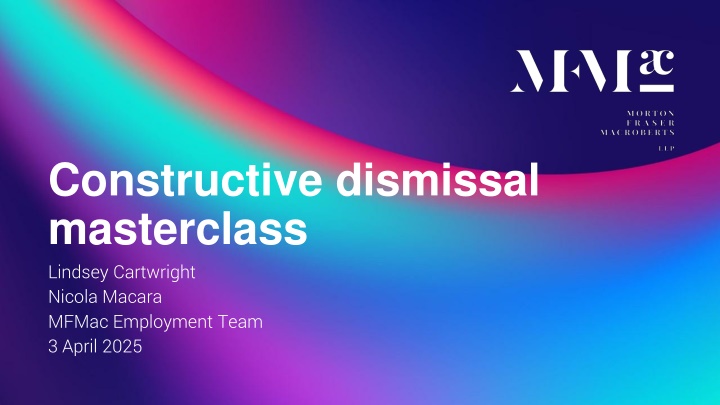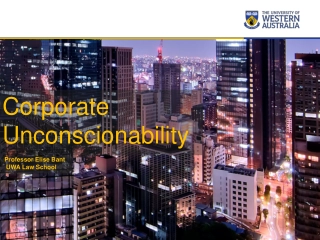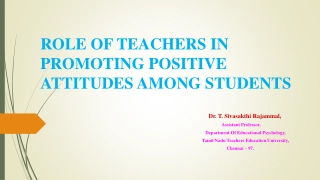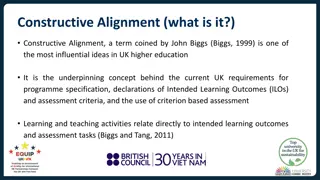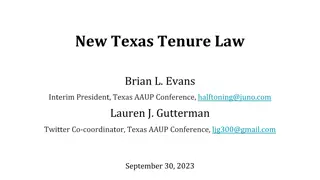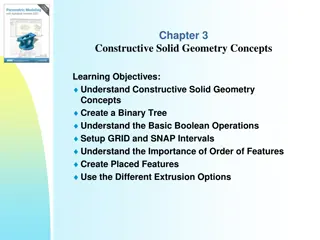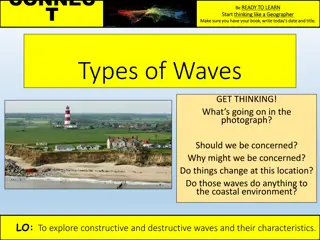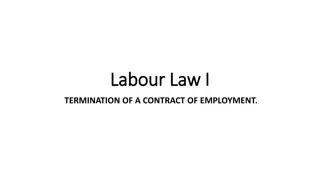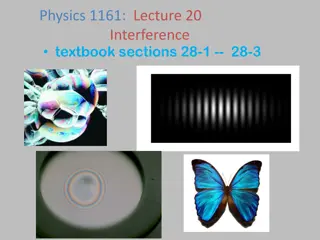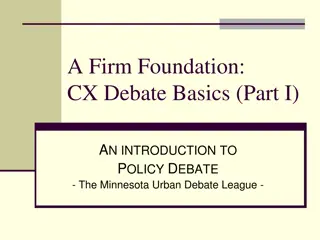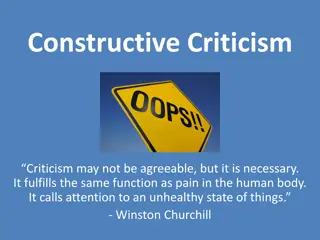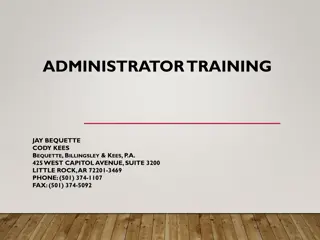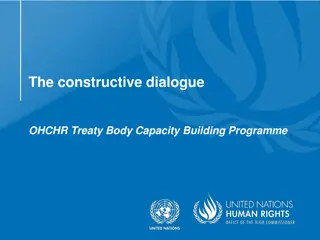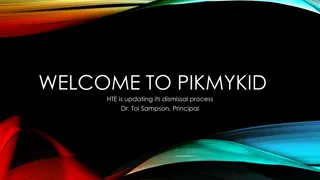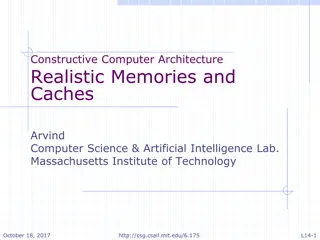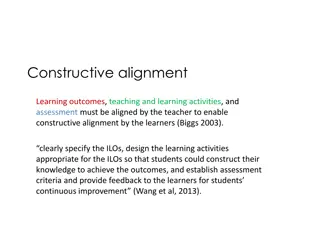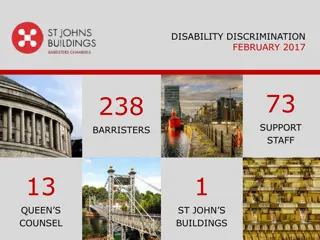Constructive Dismissal Masterclass Overview
Constructive dismissal explained: overview, implied duty of trust, financial exposure, responding to claims, defense strategies, grey areas, tips, Q&A. Details on resignation, notice period, legal case examples.
Download Presentation

Please find below an Image/Link to download the presentation.
The content on the website is provided AS IS for your information and personal use only. It may not be sold, licensed, or shared on other websites without obtaining consent from the author.If you encounter any issues during the download, it is possible that the publisher has removed the file from their server.
You are allowed to download the files provided on this website for personal or commercial use, subject to the condition that they are used lawfully. All files are the property of their respective owners.
The content on the website is provided AS IS for your information and personal use only. It may not be sold, licensed, or shared on other websites without obtaining consent from the author.
E N D
Presentation Transcript
Constructive dismissal masterclass Lindsey Cartwright Nicola Macara MFMac Employment Team 3 April 2025
What we will look at What is constructive dismissal? The implied duty of mutual trust and confidence Potential financial exposure Responding to the threat of a claim Defending a constructive dismissal claim Grey areas and practical tips Q&A
What is constructive dismissal? Constructive dismissal is the phrase we use for the scenario set out in s95(1)(c) of the Employment Rights Act 1996 which states that an employee is dismissed by their employer where:- the employee terminates the contact under which he is employed (with or without notice) the employee terminates the contact under which he is employed (with or without notice) in circumstances in which he is entitled to terminate without notice by reason of the in circumstances in which he is entitled to terminate without notice by reason of the employer s conduct employer s conduct There are 4 important elements: The employee resigns It can be with or without notice They do so in circumstances in which they are entitled to do so (which necessitates a repudiatory breach of contract by the employer) The repudiatory breach is accepted by the employee (meaning the resignation is in response to it)
Resignation and notice Employee must resign in response to the breach, but the breach does not have to be the only cause of the resignation The employee must not delay too long in accepting the breach doing so may suggest the employee has waived the breach and affirmed the contract as continuing The Act specifically provides that they can resign with notice (continuing to work during notice does not normally prejudice employee) Employee is no longer bound by contract, e.g. restrictive covenants (but will remain bound by confidentiality obligations) Employee does not have to say why they are resigning
Case delay in resigning was too long Quigley v University of St Andrews UKEATS/0025/05 Mr Quigley was a lecturer at the University of St Andrews. Mr Quigley had applied for a promotion but did not get it. He appealed the decision. His appeal was not allowed. Two month long delay before he submitted his resignation letter. Explanation - the delay was because it took some time to arrange a meeting with his solicitor. Employment Tribunal dismissed his constructive dismissal claim. The EAT dismissed his appeal. Held, he had not proved any of the alleged breaches of the implied duty of trust and confidence and even if he had, he had waived it by allowing too much time to pass.
Case delay in resigning because of grievance Brooks v Leisure Employment Services Ltd (2023) Brooks v Leisure Employment Services Ltd (2023) Employee worked in employer s call centre for 30 years selling resort holidays - her pay was largely commission-based. Covid-19 resorts closed - employer decided she should work from home dealing with customer issues instead of sales - set up a Whatsapp group for staff working from home. Claimant concerned re her income raised a concern. No answer given - removed from the Whatsapp without explanation. Grievance submitted April 2020 saying she reserved all her rights. June 2020 grievance ongoing. Claimant resigned with immediate effect. Tribunal decided she had delayed too long. EAT allowed appeal, remitting back. Referred to Kaur case exercise of contractual grievance unlikely to be an unequivocal affirmation of the contract.
What is a repudiatory breach? Repudiatory breach can be an actual breach or an anticipatory one It can arise from a single serious incident or a series of less serious acts that cumulatively amount to a serious breach Must go to the root of the contract of employment and be sufficiently serious to undermine the relationship
Who can claim? Constructive dismissal is an unfair dismissal claim, so the same provisions apply. Open to:- Employees With 2 years qualifying service (unless resignation was due to treatment that was discriminatory or deemed automatically unfair) Qualifying service requirement expected to be repealed in late 2026 It is for the employee to prove they have been constructively dismissed (unlike normal unfair dismissal)
Common causes Significant reduction to salary or benefits Unilateral changes to job role or location Unsafe working conditions Undermining trust and confidence in the employment relationship eg Failure to provide impartial grievance process Giving a false reason for dismissal Failure to protect employee from workplace bullying Behaviour that is simply unreasonable is not enough
Implied duty of mutual trust and confidence Broadly speaking it is a duty implied into the contract of employment that neither party will undermine the employment relationship In the context of constructive dismissal:- The employer must not, without reasonable and proper cause, conduct itself in a manner calculated and [or] likely to destroy or seriously damage the relationship of trust and confidence between employer and employee Malik and anor v BCCI Malik and anor v BCCI
Implied duty of mutual trust and confidence In deciding whether the duty is breached an employment tribunal will consider:- Was there a reasonable proper cause for the employer s conduct? If not, was the conduct calculated or likely to destroy or seriously damage trust and confidence? It is not necessary to show the employer intended to repudiate the contract, or for the employer to have acted with malice
Implied duty of mutual trust and confidence Last straw doctrine Employee may resign in response to a series of breaches of contract/course of conduct that cumulatively amounts to a breach of the implied term of trust and confidence Final straw must contribute something to the breach, but it may be relatively insignificant In itself, it does not need to be blameworthy (although it usually will be) although it cannot be totally innocuous objective test Can bring to life earlier breaches that might otherwise have been waived
Case last straw (claim won) Williams v Governing Body of Alderman Davies Church in Wales Primary School Mr Williams - primary school teacher. Had an impairment which affected his reaction to stress. Child protection allegation - suspended. The Respondent refused to tell Mr Williams any details. Later told that the allegation was that he manhandled a child. He returned to school, but not to teaching duties, whilst the school proceeded with disciplinary action. He downloaded a number of documents to show to his Union, to give them an understanding of how poorly the school had treated him. Later discovered he also shared some of the documents with a fellow teacher, the TU rep. Head teacher discovered this, re-suspended him and began a second disciplinary investigation for breach of the school's data protection policy. He also began a disciplinary investigation of the colleague - instructed the colleague not to contact Mr Williams. Mr Williams complained to the school that he was not given enough detail on the child protection issue and had completely lost faith in being treated fairly. He resigned a few days later. Claimed that the prohibition on his colleague contacting him was the last straw and claimed constructive dismissal. Claim successful (at appeal stage).
Case last straw (claim lost) Waltham Forest v Omilaju Mr Omilaju brought 5 sets of Tribunal proceedings against his employer in 2 years. Contract said that employees must apply for special unpaid leave or annual leave to attend tribunal. Mr O was absent from work without leave to attend his tribunal hearing for discrimination. He resigned claiming that the refusal to pay his salary was the last straw. Brought a new claim for constructive dismissal unsuccessful. Council's decision not to pay Mr O for his absence was reasonable conduct under his contract applying the rationale that it may be relatively insignificant but cannot be utterly trivial failure to pay, implementing the contract, could not be a final straw incident.
Potential financial exposure Compensation following successful tribunal claim Basic award Compensatory award Compensation may be subject to adjustment (Acas uplift/reduction, mitigation, contributory fault) Reputational damage may impact recruitment, customer trust, employee morale, and ultimately may impact on profit
How to respond to the threat of a claim Intervene early when faced with an unhappy employee Encourage open communication so concerns do not escalate Follow the grievance procedure and document its progress, putting in place steps to alleviate concerns meantime Consider internal mediation Consider initiating or participating in settlement discussion via a protected conversation or without prejudice communication But ..it may not save you ..
Case cant remedy a material breach by following a fair process afterwards Bournemouth University Higher Education Corp v Buckland Prof B was a University professor marked student papers and failed a higher proportion than usual. Second marker endorsed his marks and the Board of examiners checked and confirmed results. Chair of Board of examiners instructed a re-marking and some scores elevated. Prof B objected inquiry brought. Inquiry vindicated Prof B and criticised the Board s conduct. Prof B resigned and claimed constructive dismissal successful at Tribunal (confirmed on final appeal). University argued that by conducting the inquiry and vindicating Prof B, they had remedied the breach. Held, a repudiatory breach, once complete, is not capable of being remedied so as to preclude the innocent party from relying on it / taking action.
Defending a claim Key areas of challenge:- Employer has not breached the contract as alleged The action (or inaction) of the employer was not sufficient to amount to a material breach of contract The employee has resigned for a reason not connected to the alleged breach by the employer The employee has affirmed the contract (by delaying too long)
Grey areas What if there is more than one reason for resignation? How long is too long to wait to resign, particularly if there is a grievance ongoing? What is the impact of failure to raise a grievance prior to resignation? What if the employee states they are continuing to work under protest?
Considerations for employees Difficult claim to succeed, so prospects of success are reduced, compared with normal unfair dismissal Burden of proof is on them must consider how they will prove it (which for a last straw case might mean proving lots of different events over a period of time) Will have to meet their legal fees and not recover them Balance:- Very hard to advise someone to give up their income with no other job to go to; BUT If they wait and resign later, might affect reason for resignation and might have delayed too long (and compensation will be lower because of new job)
Practical tips for employers Have appropriate procedures in place, supported by policy documentation to demonstrate commitment to fair treatment Apply policies consistently Take complaints seriously and address grievances promptly Train managers to handle workplace conflict foster a supportive culture Ensure clear communication & consultation on contractual changes Make employees aware of the reasons underpinning decisions Document discussions
Constructive dismissal masterclass Lindsey Cartwright Nicola Macara MFMac Employment Team 3 April 2025
